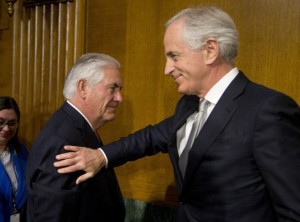Trump’s choice for top US diplomat talks tough on China

Sen. Bob Corker (Republican-Tennessee), chairman of the Senate Foreign Relations Committee,, right, pats Secretary of State-designate Rex Tillerson , left, on the shoulder after his testimony before the Senate Foreign Relations Committee on Capitol Hill in Washington, Wednesday, Jan. 11, 2017, (Photo by STEVE HELBER/AP)
WASHINGTON — Pointing toward possible confrontation, Donald Trump’s selection for secretary of state likened Beijing’s island-building in the South China Sea to a takeover of another country’s territory and spoke of forcing Beijing to fully apply sanctions on North Korea.
China will likely be alarmed by former Exxon Mobil CEO Rex Tillerson’s Senate confirmation hearing remarks on Wednesday. While they focused largely on Russia, reflecting Tillerson’s past relationship with its President Vladimir Putin and allegations of Russian hacking into the US election, his testimony on China presented a sharp change in tone from the Obama administration’s focus on cooperation.
Under Obama, the US has worked with China to fight climate change and contain Iran’s nuclear program. But Beijing has only half-heartedly pressed North Korea over its nuclear weapons program and has willfully disregarded Washington’s appeals to moderate its activities in the South China Sea.
It has reclaimed more than 3,000 of acres of land and constructed military-grade infrastructure, and reportedly installed weaponry, on reefs and islets mostly in the Spratly Island chain, where five other governments have territorial claims.
Accusing Beijing of “declaring control of territories that are not rightfully China’s,” Tillerson compared its island-building efforts and deployment of military assets on the islands to Russia’s 2014 annexation of Crimea — an action that ended up prompting tough US and European sanctions.
Article continues after this advertisementHe called China’s actions “extremely worrisome.” The US failure to respond “has allowed them to keep pushing the envelope” in seas that carry $5 trillion of trade annually, he said, suggesting Trump would adopt a tougher approach.
Article continues after this advertisement“This is a threat to the entire global economy if China is allowed to somehow dictate the terms of passage through these waters,” Tillerson told the Senate Foreign Relations Committee.
Asked if he supported a more aggressive US posture, he said, “You’re going to have to send China a clear signal that first the island building stops, and second your access to those islands is also not going to be allowed.”
China’s embassy in Washington didn’t immediately respond to a request for comment. China is stressing mutual respect and cooperation in response to the tough talk from Tillerson.
Such rhetoric from Washington isn’t surprising. Past US administrations have entered office seeking to get tougher on China, and failed. Trump himself has threatened to impose punitive tariffs to address America’s trade imbalance with China and tested ties by questioning the longstanding US policy on the status of Taiwan.
A perennial challenge is to break China’s long-time partnership with North Korea’s hereditary dictatorship. Beijing is unwilling to exercise economic pressure that could destabilize its unpredictable ally, even as it shares US concerns about the isolated nation’s rapid development of nuclear weapons and ballistic missiles to deliver them.
Earlier this week, outgoing Secretary of State John Kerry chided Beijing over its efforts to pressure North Korea, which relies on China for 90 percent of its international trade. He said China needed to “increase its focus” and that the US may need “more forceful ways” of dealing with North Korea.
Tillerson spoke in starker terms. He accused China of making “empty promises” on North Korea and supported US sanctions on Chinese companies found to be violating UN Security Council resolutions, recently beefed up to tighten restrictions on North Korean coal imports.
“If China is not going to comply with those UN sanctions then it’s appropriate for the United States to consider actions to compel them to comply,” Tillerson said.
Speaking generally, he described military force as the “least attractive option.” And he sought to play down Trump’s recent tweet on North Korea’s development of a missile that could strike America — “It won’t happen!” — saying it wasn’t a “red line.” –Matthew Pennington